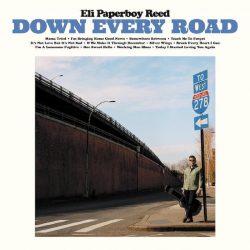Interesting R’n’B take on Haggard’s blue collar country classics.
 Eli “Paperboy” Reed first burst on to the scene in 2008 with his debut album, ‘Roll With You’. A high octane explosion of original R’n’B material with a retro sound that positioned itself along side the classic soul movement of the sixties with the influence of the likes of Sam Cooke, Jackie Wilson, James Brown, and Wilson Pickett unashamedly pronounced. Its success saw Reed go on to be voted, ‘Break Through Artist Of The Year’, at the Mojo Awards in 2009, and lay the foundation for the next ten years, including the 2019 release, ’99 Cent Dreams’, which was chosen as one of Allmusic’s favourite Blues Albums of that year. Then the pandemic shut everything down. With touring off the agenda, Reed has taken the opportunity to immerse himself in his other musical passion, that of country music, and in particular the work of Merle Haggard. ‘Down Every Road’, is an album that tries to reinterpret rather than recreate some of Haggard’s best known songs replacing the twang of the guitar and the shuffling rhythms for Memphis organ and Stax horns. How well that works may well depend on individual taste, for as the legendary, ‘Blues Brothers’ once said, “country and soul make strange bedfellows”, and yet the subject matter of loneliness, longing and love lie at the heart of both musical genres.
Eli “Paperboy” Reed first burst on to the scene in 2008 with his debut album, ‘Roll With You’. A high octane explosion of original R’n’B material with a retro sound that positioned itself along side the classic soul movement of the sixties with the influence of the likes of Sam Cooke, Jackie Wilson, James Brown, and Wilson Pickett unashamedly pronounced. Its success saw Reed go on to be voted, ‘Break Through Artist Of The Year’, at the Mojo Awards in 2009, and lay the foundation for the next ten years, including the 2019 release, ’99 Cent Dreams’, which was chosen as one of Allmusic’s favourite Blues Albums of that year. Then the pandemic shut everything down. With touring off the agenda, Reed has taken the opportunity to immerse himself in his other musical passion, that of country music, and in particular the work of Merle Haggard. ‘Down Every Road’, is an album that tries to reinterpret rather than recreate some of Haggard’s best known songs replacing the twang of the guitar and the shuffling rhythms for Memphis organ and Stax horns. How well that works may well depend on individual taste, for as the legendary, ‘Blues Brothers’ once said, “country and soul make strange bedfellows”, and yet the subject matter of loneliness, longing and love lie at the heart of both musical genres.
The album wastes no time in stating it’s intentions, as it opens with one of Haggard’s most famous songs, ‘Mama Tried’, where the organ and horns join the guitar and rhythm section to propel the track at a fiery pace, while Reed sings with a passion and commitment that tries to get to the very heart of the song. This feel is continued with the following number, ‘I’m Bringing Home Good News’, where the horns and Reed’s voice combine to create a wonderful up beat intensity that would have gone down a storm on the dance floors of Wigan back in the halcyon days of northern soul.
It would be fair to say the this mix of musical genres is seen to best effect on the uptempo numbers which, ‘I’m Gonna Break Every Heart I Can’, is another fine example. Here Reed’s gritty guitar sound finds the groove that leads the horn section, while his vocals conjure up memories of the great northern soul star Al Wilson. ‘I’m A Lonesome Fugitive’, follows in a similar vain but with slightly less success, and it is with the slower numbers where the album starts to feel slightly awkward, where the groove is replaced by a smoother, cleaner almost sanitised sound which in turn leans to a more poppier feel. Consequently this creates a slightly uncomfortable juxtaposition with the decidedly grittier, dirt under the finger nails, blue collar lyrics.
The groove is rediscovered on, ‘Working Man Blues’, where Reed manages to deliver a swamp rock vibe that Tony Joe White would have been proud of with some tasty slide guitar added to the mix making this interpretation a rousing success. The album closes with, ‘Today I Started Loving You Again‘, where Reed is joined on lead vocals by Sabine McCalla and together they recreate the sound that Buck Owens and Betty Swan aimed for on their version that was never officially released. Here, despite the slow tempo of the song the two vocals manage to get to the very heart of the track, creating a wonderful finale to the album.
There is no doubt that the mix of soulful R’n’B and country music works, as it has for numerous artists before, and at times works wonderfully well here. If there is a slight issue, it may well be Reed’s choice of material or, to be more exact choice of artist. Haggard wasn’t just a songwriter, his life style and experiences embodied his work probably more than most, and his honesty and integrity that inhabited every word gave his poetry a sense of authenticity that is very hard to replicate or reinterpret. Almost impossible when removed from the environment from which it was written. However, this an enjoyable album, with numerous high points and who knows, the next time you fancy throwing a few shapes on the dance floor, the odd spin, flip or backdrop, you could be doing it to a cover of a Merle Haggard tune.


